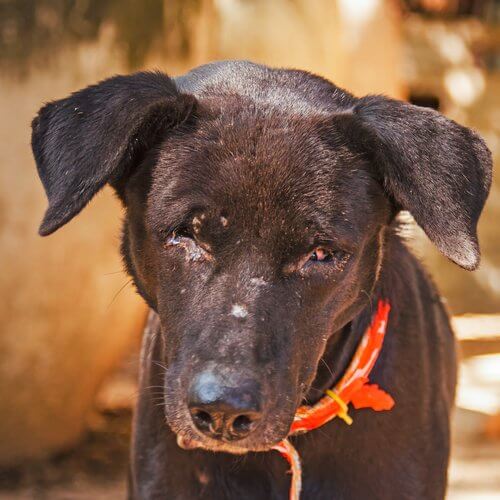Helping An Abused Dog to Trust Again

Sometimes when wanting to help a street dog or an abused dog, we may realize that he acts differently to other dogs. He might try to bite you, bark a lot, or run away.
It’s fundamental to know how to treat these dogs, so that they can regain trust in human beings. The trauma left in the animal from abuse is a deep one, but, with the right help, it’ll disappear little by little.
Animal abuse: it’s not only physical
You first need to understand what has happened to the abused dog before we can talk about how to deal with him. Dogs, like people, can exhibit extreme behavior in the way they act and relate to others because of the traumas they have suffered in the past.

In this case, you’ll need to take the dog to a veterinarian to figure out what has happened to the animal and how to treat him. The specialist will also be able to tell you if it’s a case of physical or emotional animal abuse (or both).
The former will require a thorough clinical examination to detect if there’s any kind of external or internal injury. In addition, if the dog took a beating it’s probable that soft tissues, organs or bones may have been affected. It’s also a good idea to check his nervous and muscular system as well.
A medical test won’t be able to determine emotional abuse. Therefore, you should watch the dog’s behavior and reactions. Abandonment, lack of affection, malnutrition, unhealed wounds, illnesses, not being vaccinated, having gone through many pregnancies… all of these are signs that the dog has not been treated properly.
In these cases the dog will also need medical treatment. In other words, the treatment should include a balanced diet, cleaning of the wounds, vaccination, and sterilization.
What to do if you witness animal abuse
If the abused dog is inside a house, competent authorities should be informed. They can analyze the situation and, if necessary, take the animal to a shelter.
If you’ve found it in the street and want to adopt it, then bear in mind that its recovery could take a long time depending on how badly it was treated.
It’s not possible to determine the duration of medical or psychological treatment. Everything usually depends on the age, the damage, the dog’s personality, and so on. By psychological treatment we mean the kind of care given to the abused dog.
As owners, rescuers or helpers, what we shouldn’t do under any circumstances is medicate the animal without consulting an expert. We shouldn’t speak to the dog loudly or assume that a plate of food and a bath is enough for him to heal.
Steps for helping an abused dog to recover
A physically or emotionally damaged animal will act strangely without meaning to. They’re simply trying to defend themselves because of their past experience. Compulsive behaviors will be noticeable and we should be understand them, and not reprimand them. The keys to help a dog that has suffered animal abuse to recover are:
1. Slow movements
Sudden changes in posture will make the dog nervous and he may want to attack. Rapid movements will remind him of the violence he has experienced. Therefore, it’s best to walk slowly, approach him gently and wait for his reaction before moving forward. If the dog observes that the contact is gentle, he’ll feel more confident and will begin to trust again.
2. Use a soft voice

Your voice is also essential in creating an environment in which the dog can feel comfortable and confident. Shouting or yelling can be felt by the dog as if someone is hitting him. Remember that a low or high toned voice can be considered by him to be a dangerous situation.
3. Provide shelter
A cozy blanket, a plate of food, some water, a hot bath, a roof over his head… these are all things the dog hasn’t been used to. For this reason, he needs to see all of that as something good and as protection. Therefore, try to create a comfortable area for him to lie down and sleep. It’s a good idea to keep him in a separate room from other animals. This will make him feel more confident.
4. Take him for a walk
Short walks and playtime in the park are an excellent gift for a dog that has suffered violence and abuse. Above all, you must remember that this poor animal has never received any signs of affection. Because of this, going for short walks can help a lot in the treatment.
Sometimes when wanting to help a street dog or an abused dog, we may realize that he acts differently to other dogs. He might try to bite you, bark a lot, or run away.
It’s fundamental to know how to treat these dogs, so that they can regain trust in human beings. The trauma left in the animal from abuse is a deep one, but, with the right help, it’ll disappear little by little.
Animal abuse: it’s not only physical
You first need to understand what has happened to the abused dog before we can talk about how to deal with him. Dogs, like people, can exhibit extreme behavior in the way they act and relate to others because of the traumas they have suffered in the past.

In this case, you’ll need to take the dog to a veterinarian to figure out what has happened to the animal and how to treat him. The specialist will also be able to tell you if it’s a case of physical or emotional animal abuse (or both).
The former will require a thorough clinical examination to detect if there’s any kind of external or internal injury. In addition, if the dog took a beating it’s probable that soft tissues, organs or bones may have been affected. It’s also a good idea to check his nervous and muscular system as well.
A medical test won’t be able to determine emotional abuse. Therefore, you should watch the dog’s behavior and reactions. Abandonment, lack of affection, malnutrition, unhealed wounds, illnesses, not being vaccinated, having gone through many pregnancies… all of these are signs that the dog has not been treated properly.
In these cases the dog will also need medical treatment. In other words, the treatment should include a balanced diet, cleaning of the wounds, vaccination, and sterilization.
What to do if you witness animal abuse
If the abused dog is inside a house, competent authorities should be informed. They can analyze the situation and, if necessary, take the animal to a shelter.
If you’ve found it in the street and want to adopt it, then bear in mind that its recovery could take a long time depending on how badly it was treated.
It’s not possible to determine the duration of medical or psychological treatment. Everything usually depends on the age, the damage, the dog’s personality, and so on. By psychological treatment we mean the kind of care given to the abused dog.
As owners, rescuers or helpers, what we shouldn’t do under any circumstances is medicate the animal without consulting an expert. We shouldn’t speak to the dog loudly or assume that a plate of food and a bath is enough for him to heal.
Steps for helping an abused dog to recover
A physically or emotionally damaged animal will act strangely without meaning to. They’re simply trying to defend themselves because of their past experience. Compulsive behaviors will be noticeable and we should be understand them, and not reprimand them. The keys to help a dog that has suffered animal abuse to recover are:
1. Slow movements
Sudden changes in posture will make the dog nervous and he may want to attack. Rapid movements will remind him of the violence he has experienced. Therefore, it’s best to walk slowly, approach him gently and wait for his reaction before moving forward. If the dog observes that the contact is gentle, he’ll feel more confident and will begin to trust again.
2. Use a soft voice

Your voice is also essential in creating an environment in which the dog can feel comfortable and confident. Shouting or yelling can be felt by the dog as if someone is hitting him. Remember that a low or high toned voice can be considered by him to be a dangerous situation.
3. Provide shelter
A cozy blanket, a plate of food, some water, a hot bath, a roof over his head… these are all things the dog hasn’t been used to. For this reason, he needs to see all of that as something good and as protection. Therefore, try to create a comfortable area for him to lie down and sleep. It’s a good idea to keep him in a separate room from other animals. This will make him feel more confident.
4. Take him for a walk
Short walks and playtime in the park are an excellent gift for a dog that has suffered violence and abuse. Above all, you must remember that this poor animal has never received any signs of affection. Because of this, going for short walks can help a lot in the treatment.
All cited sources were thoroughly reviewed by our team to ensure their quality, reliability, currency, and validity. The bibliography of this article was considered reliable and of academic or scientific accuracy.
Flynn, C. P. (2007). Just A Dog: Understanding Animal Cruelty and Ourselves. Anthrozoös. https://doi.org/10.2752/175303707×207981
This text is provided for informational purposes only and does not replace consultation with a professional. If in doubt, consult your specialist.








